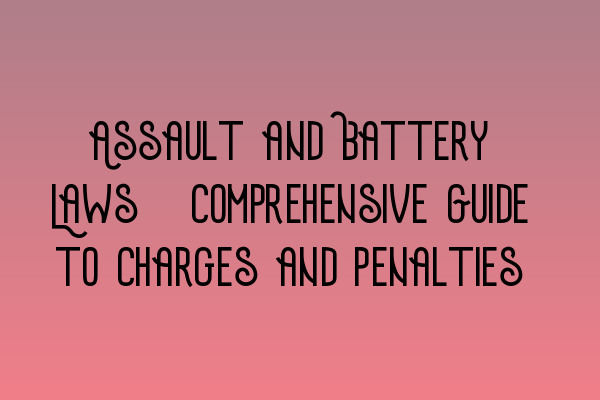Assault and Battery Laws: Comprehensive Guide to Charges and Penalties
Welcome to SQE Criminal Law & Practice Law UK, your go-to resource for all things related to criminal law. In this comprehensive guide, we will delve into the intricacies of assault and battery laws, covering the various charges and penalties associated with these offenses. Whether you are a law student, legal professional, or someone interested in understanding the legal system, this guide will provide you with valuable insights.
Understanding Assault and Battery
Assault and battery are two distinct but closely related offenses in criminal law. Assault refers to the intentional act of creating a reasonable apprehension of harmful or offensive contact in another person’s mind. On the other hand, battery refers to the actual intentional and unlawful physical contact with another person.
It’s important to note that assault and battery can be charged as separate offenses or as a single combined offense, depending on the jurisdiction and the specific circumstances of the case.
Types of Assault and Battery Charges
Assault and battery charges can vary in severity based on the level of harm inflicted, the intention of the perpetrator, and other factors. Here are some common types of assault and battery charges:
- Simple Assault: This is the most basic form of assault, involving the intentional act of causing apprehension of harmful or offensive contact. It typically carries lesser penalties compared to other assault charges.
- Aggravated Assault: Aggravated assault involves more serious acts and often includes the use of a deadly weapon. The penalties for aggravated assault can be significantly higher.
- Domestic Assault: When assault occurs within a domestic relationship, it is categorized as domestic assault. The legal consequences of domestic assault vary and may involve additional protective measures.
- Sexual Assault: Sexual assault refers to any non-consensual sexual activity and is considered a grave offense. The penalties for sexual assault are severe, and the legal system aims to protect victims and bring perpetrators to justice.
- Battery: Battery charges are related to the actual physical contact and can range from simple battery to aggravated battery, depending on the seriousness of the harm caused or intended.
Penalties for Assault and Battery Offenses
The penalties for assault and battery offenses vary depending on the jurisdiction and the specific circumstances of the case. Factors like the severity of harm caused, the offender’s criminal history, and whether a deadly weapon was used can influence the penalties imposed. In general, the more serious the offense, the harsher the penalties.
Penalties for assault and battery offenses can include fines, probation, community service, mandatory counseling, restraining orders, and imprisonment. It’s important to consult with a qualified criminal defense attorney if you or someone you know is facing assault or battery charges to understand the potential consequences and build a strong defense strategy.
Seek Legal Guidance from SQE Criminal Law & Practice Law UK
If you require professional legal assistance or guidance regarding assault and battery offenses, our team of expert solicitors at SQE Criminal Law & Practice Law UK is here to help. We specialize in criminal law and have a wealth of experience representing clients in cases involving assault and battery charges.
For additional resources and information related to SQE exam preparation, we recommend checking out the following articles:
- SQE 1 Practice Exam Questions
- SQE 1 Practice Mocks FLK1 FLK2
- SQE 2 Preparation Courses
- SQE 1 Preparation Courses
- SRA SQE Exam Dates
Our commitment is to provide reliable and trustworthy legal information to help you navigate the complexities of the criminal justice system. Stay tuned for more informative content from SQE Criminal Law & Practice Law UK.
